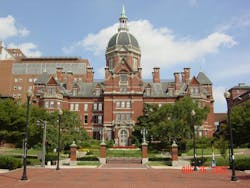Historic Baltimore college campus signs up for Solar Power Generation from Virginia farm
The nation’s first research university and a fount for early information on the spread of the coronavirus is also staking a claim as a leader in clean energy self-sufficiency.
The Johns Hopkins University in Baltimore has signed an agreement to purchase solar power from the Skipjack Solar Center in nearby Virginia. The solar farm site in Charles City County is about 175 miles from Baltimore.
The agreement will help the university achieve its goal to reduce GHG emissions by 51%, three years in advance. The purchase was made possible through a long-term agreement with carbon-free energy producer Constellation.
The Skipjack Solar Center is built on the land of a former timber farm. It has more than 500,000 solar panels which produce more than 350,000 MWh of solar power annually. The generated power is supplied to PJM, the country's largest electricity grid, which spans 13 states. The solar power produced helps reduce GHG emissions by more than 150,000 metric tons.
Developer on the Skipjack Solar project was Constellation, with construction contractors including sPower, an AES and AIMCO Company, according to reports. Johns Hopkins University committed to the project as far back as its 2019 origins.
The electricity supplied to the Johns Hopkins University will cover two-thirds of the annual electricity needs at the university.
More University Energy News
Boston University going Geothermal to supply new Center for Computing and Data Sciences
University of Rochester, NY, subscribes to Amp Power Community Solar project
Illinois university research team leading R&D on Carbon Capture
Power purchase agreements are long-term commitments to pay for renewable energy projects. The power generated doesn’t necessarily go directly to the customer, but the investment helps fund clean energy projects and its connection to decarbonizing the power grid.
"Taking part in this major, utility-scale development is an opportunity to significantly and fundamentally change the environmental impact of our academic and research activities, and to support the expansion of clean power throughout the region," says Bob McLean, vice president of facilities and real estate at Johns Hopkins University.
Additionally, Johns Hopkins has seven solar rooftop installations across campuses. The university is also working on a new sustainability plan.
Johns Hopkins University was founded in 1876. Since then, its faculty and staff has included 39 Nobel lauretes.
Beginning in 2020, JHU also has put out a constantly updated map of the spread of COVID-19 both in the U.S. and around the world. The university also houses one of the top-ranked medical schools in the U.S.
About the Author
EnergyTech Staff
Rod Walton is head of content for EnergyTech.com. He has spent 17 years covering the energy industry as a newspaper and trade journalist.
Walton formerly was energy writer and business editor at the Tulsa World. Later, he spent six years covering the electricity power sector for Pennwell and Clarion Events. He joined Endeavor and EnergyTech in November 2021.
He can be reached at [email protected].
EnergyTech is focused on the mission critical and large-scale energy users and their sustainability and resiliency goals. These include the commercial and industrial sectors, as well as the military, universities, data centers and microgrids.
Many large-scale energy users such as Fortune 500 companies, and mission-critical users such as military bases, universities, healthcare facilities, public safety and data centers, shifting their energy priorities to reach net-zero carbon goals within the coming decades. These include plans for renewable energy power purchase agreements, but also on-site resiliency projects such as microgrids, combined heat and power, rooftop solar, energy storage, digitalization and building efficiency upgrades.
